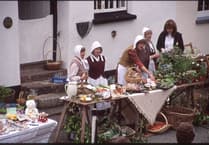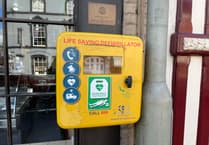ON Friday, May 26, members of Thorverton History Society were fortunate to have the swashbuckling Robin Blythe-Lord to step once more into the breach (dear friends) to replace a last minute cancellation due to illness.
Robin provided a tour de force to a well attended audience on a glorious evening upon the relatively unknown Somerset man, William Batten (1601 to 1667) who rose to prominence, and wealth, and for whom the Plymouth Sound promontory is now named…cast your mind back to The History of Mount Batten a previous talk given by our very same interlocutor.
Robin’s presentation was supported by a wealth of detailed research and background information of the life and times of this 17th century character as well as a supporting selection of millinery - just to give us the full flavour of the man and his tricky road to prominence and his remarkable accumulation of wealth and naval offices.
William was the second son of Andrew Batten, mariner, born in Easton in Gordano, Somerset. Originally apprenticed into the Merchant Taylors’ Company in London, by the age of 23, he was a freeman and married Margaret Browne the next year, with whom he was to have four children (two boys and two girls).
He quickly returned to his father’s profession as a captain and his own ship, the Salutation, and took out Letters of Marque which authorised him as a privateer for the king, thus allowing him to capture enemy merchant ships and to profit from their sale.
By 1638 he had, through patronage, acquired the surveyorship of the navy a "jolly good earner".
With the coming of the civil war, his patron Algernon Percy, sided with the Parliamentarians and with Batten’s connections he secured his nomination as the second in command to the Earl of Warwick, leading to his promotion to Vice Admiral and Treasurer of the navy, later becoming acting Commander in Chief maintaining supplies and communications for the parliamentary forces.
He was involved in pursuit of the Queen and later The Prince of Wales and gave support at the siege of Lyme Regis.
Most importantly for our story, Plymouth, which had declared for Parliament, was supported by William Batten.
The author Philip Photiou writes in "Plymouth’s Forgotten War": "(Around August 1644) Captain William Batten further depleted his squadron by drafting seamen for shore defence.
"Recently many of his sailors had been working on How Stert, (originally from the Celtic: hawe stert) throwing up an earthwork across the lower part of the peninsula.
"Now with the King before the town the work ceased and the men were transferred to the outworks"… "This narrow peninsula, now known as Mount Batten in honour of Captain William Batten, had since August (1645) been turned into a strong fortification by gangs of sailors taken from ships anchored at Plymouth.
"Batten himself poured £500 of his own money into the project. This new fort would allow the Parliamentarians to use the peninsula as a base for raids against the enemy at Plymstock."
During the later part of the civil war Batten was suspected of collusion with the Scots and was made to resign his vice admiralty.
He defected to the Royalist cause for and was knighted and made a rear admiral! He does appear to have been distrusted by many.
He later resigned his commission and returned to England and remarried a wealthy widow with a fine house called Rectory Manor in Walthamstow, where he later died and is buried inside St Mary’s Church.
In the interim he had been reinstated as Surveyor of the Navy and worked alongside Samuel Pepys (the diarist) at the Navy Board who also provides an insight into his character..“…specially Sir W. Batten, whose cheats I do daily oppose to his great trouble, though he appears mighty kind and willing to keep friendship with me.”
In 1661 Batten was elected MP for Rochester and as surveyor he was also a JP for the counties in which the naval dockyards stood.
In 1663-4 he was master of Trinity House and in that capacity built almshouses for the corporation and later two lighthouses at Harwich, the dues of which secured him an excellent income. His black slave Mingo was left the custody and keeping of these lighthouses while his wife was left his debts!
So leaving this account in the words of Robin… we reach the end of our story. Batten was certainly brave, corrupt, a turncoat, a slave owner, a spendthrift and a personally unpleasant man but he was a product of his time and operated well within his society which brought us to our society. We should not judge the past by today’s standards.
Thanks go from us all for such an entertaining glimpse into yet another local character.
Recorded by Ann Marshall




